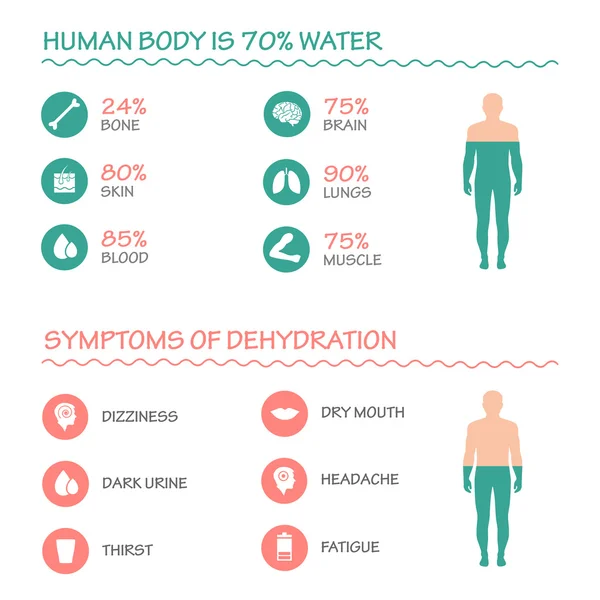Dehydration is a condition that occurs when your body loses more fluids than it takes in.
Water is life, Drinking enough water consistently maintains your overall health and well-being. Inadequate intake can have significant implications on your health such as premature aging and poor immunity. You need to stay hydrated through adequate water intake or consumption of hydrating foods.
In this blog post, we will explore the signs of dehydration, its various effects on the body, and the best tips on how to stay adequately hydrated.
What are Signs of Dehydration
Are you wondering if you’re mildly or chronically dehydrated?
Symptoms of mild to moderate dehydration include thirst, dry mouth, dizziness, headache, and dark urine. Severe dehydration on the other hand can cause extreme thirst, very dry mouth, rapid breathing and heartbeat, low blood pressure, fever, and little or no urine. Infants, young children, older adults, and people with chronic diseases or who take certain medications are at higher risk of dehydration.
Below is a summary of the signs and symptoms of dehydration.
- Thirst: One of the earliest signs of dehydration is a persistent feeling of thirst. This is the body’s way of alerting us to replenish the lost fluids.
- Dry Mouth: Insufficient water intake leads to a lack of saliva production, resulting in a dry and sticky sensation in the mouth.
- Dry Skin: Dehydration can cause a reduction in skin’s elasticity and moisture, leading to dry and flaky skin.
- Dry Eyes: Inadequate hydration can result in dry and itchy eyes, potentially leading to eye strain and discomfort.
- Joint Pains: Water acts as a lubricant for our joints. Dehydration can cause the synovial fluid, responsible for cushioning our joints, to decrease, leading to increased friction and joint pain.
- Decreased Muscle Mass: Water is essential for muscle function and repair. Inadequate hydration can lead to decreased muscle mass and reduced athletic performance.
What are the Effects of Dehydration on your Body?

Do you know that severe dehydration can cause death?
The effects of dehydration on your body can lead to serious complications. They include electrolyte imbalances, organ failure, and death. Others are confusion, rapid heartbeat, or little to no urine output, Below is a summary of how dehydration affects on the body, ranging from mild to severe.
- Cardiovascular Problems: Dehydration can cause blood vessels to narrow, leading to increased blood pressure, blood clots, and an increased risk of heart attack and stroke.
- Kidney Dysfunction: Insufficient water intake can contribute to the formation of kidney stones and decreased kidney function, potentially leading to renal complications.
- Bone Health: Dehydration can affect bone density and integrity, increasing the risk of osteoporosis, fractures, and general bone weakness.
- Weakened Immunity: Proper hydration is vital for supporting a healthy immune system, as water aids in carrying essential nutrients and oxygen to cells, while also aiding in the removal of waste products.
- Digestive Issues: Insufficient water intake can lead to constipation, as water is necessary to soften stools and promote regular bowel movements.
- Premature Aging: Dehydration can contribute to premature aging, as it reduces the skin’s ability to retain moisture, leading to the formation of wrinkles, fine lines, and a dull complexion.
Best Tips for Preventing and Combating Dehydration
To combat dehydration and its negative effects, it’s essential to follow a few simple yet effective tips we dub 9 H20-RESCUE standing for
- H: Hydrate (6-8 cups daily)
- 2: Watch for sweat and urine
- O: Opt for hydrating foods
- R: Replace dehydrating drinks
- E: Escape to the shade
- S: See pale urine color
- C: Choose oral rehydration solutions
- U: Urgent help for severe symptoms
- E: Every day, stay cool, stay hydrated!
See more details below.
- Drink an Adequate Amount of Water: The recommended daily intake of water varies, but aiming for at least 8 glasses (64 ounces) per day is a good starting point.
- Be Mindful of Fluid Loss: Engage in regular physical activity or work in hot environments. Remember to increase your water intake accordingly to compensate for fluid loss through sweat.
- Limit Diuretic Intake: Certain substances like caffeine and alcohol have diuretic effects, promoting fluid loss. Be mindful of your intake and ensure you compensate with additional water consumption.
- Eat Hydrating Foods: Many fruits and vegetables have high water content and can contribute to hydration. Examples include watermelon, cucumbers, strawberries, and grapes.
- Monitor Urine Color: A darker urine color can indicate dehydration, while lighter, pale-yellow urine generally suggests good hydration.
- Listen to Your Body: Pay attention to the signs of thirst and ensure you drink water before you feel excessively parched.
Conclusion
Staying adequately hydrated is crucial for maintaining optimal health.
A water bottle can be a practical tool to help maintain hydration by making water readily available. It can serve as a reminder, and promote regular sips of water throughout the day. Besides, it helps you to meet your daily hydration needs while also being eco-friendly.
Stay hydrated, stay healthy!



